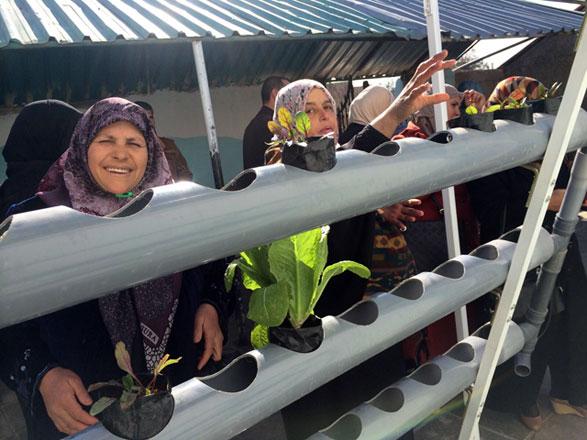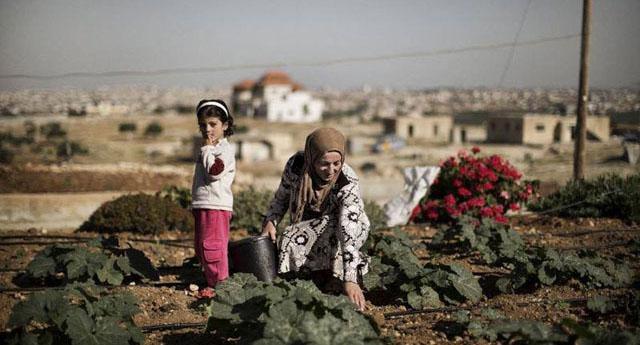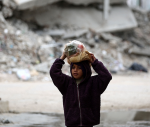You are here
Jordan’s success in reducing hunger threatened by Syrian crisis — FAO
By Khetam Malkawi - Mar 24,2015 - Last updated at Mar 24,2015
AMMAN — Although Jordan achieved the Millennium Development Goal on reducing hunger in 2013, the impact of the Syrian crisis at regional and national levels is endangering this achievement, UN officials said.
According to Food and Agriculture Organisation (FAO) officials, there are signs that the development gains achieved by Jordan in the past might be threatened because of the negative impact of the Syrian refugee influx.
In a recent interview with The Jordan Times, Nasredin Hag Elamin, FAO representative to Jordan, said the challenges facing the Kingdom are not exclusively of a short-term nature due to the Syrian crisis, but are also long-term structural challenges related to the availability of natural resources, the high dependency on food imports and the increasing volatility of food prices on the global market.
Hag Elamin noted that more than 90 per cent of the country’s needs of cereals is imported, but the high dependency on food imports is structural in nature related to the limited natural resources of water and fertile land, which do not allow for producing enough basic food products for the Jordanian population.
“To optimise the low resources of water and agriculture land, it is better to use them to produce high quality products, like fruit and vegetables,” the FAO representative said.
He explained that each country has to use its available resources in the most efficient manner. “What Jordan is currently doing seems appropriate... using the available resources to produce fruit and vegetables that generate better income for farmers.”
“The natural resources constraint can’t allow meeting the rising demand for food products particularly in a period when the population living in Jordan is growing rapidly,” Hag Elamin noted, adding that the dependency on imports is high and this is likely to increase.
Considering that food production is limited by natural factors, an increase in demand can only be met by increasing imports and optimising use of the available land and water, he said.
At the regional level, the disruption of food trade routes across borders is also one of the major problems that affects food supplies in the Kingdom as traders have to find new markets — with Syria and Iraq no longer available options — to sell local products and to utilise longer and more expensive routes to import food products to Jordan,” Hag Elamin said.
To underscore the impact of the Syrian crisis on food security in Jordan, FAO, in cooperation with the Agriculture Ministry and international NGO REACH, has conducted an assessment, the findings of which will soon be released, according to Andrea Berloffa, emergency coordinator and liaison officer at FAO Jordan.
Berloffa said the assessment seeks to gauge food security at the household level in the northern and central regions, where the highest number of Syrian refugees lives outside the camps.
Although results of the assessment are yet to be released, it shows that there is an increased level of poor and borderline food consumption scores among families in the surveyed areas, in terms of “how many times Jordanians are consuming certain products in a week and the nutritional importance of different food items”, according to the official.
In some cases, he explained, those who were interviewed said they are using cheaper food or have reduced the quantity of food purchased at the family level.
To contribute to the efforts addressing food needs in areas most affected by the Syria refugee crisis, FAO will soon implement a new project in Irbid and Mafraq, according to the agency.
“A small pilot project” is aimed at supporting vulnerable households “to look at alternative options of producing food”, Berloffa explained.
The idea of the project is to give these households an example of how to cope with this kind of situation, and “if it succeeds, it can be replicated on a larger scale so that people can develop their resilience to deal with the new reality,” he added.
Through this project FAO will assist both host communities and Syrian refugees in four selected districts in cultivating micro plots of land and rooftops, using innovative technologies to produce healthy food.
“We need to combine this with nutrition-related knowledge. Producing healthy food and utilising it in a healthy way,” Berloffa noted.
The agency has announced that it is scaling up its support to Jordan and other countries in the region affected by the humanitarian crisis in Syria, which has entered its fifth year.
FAO Director General José Graziano da Silva was in Jordan last week, where he met with officials and stressed the agency’s support for the Kingdom.
During the visit, three projects were launched with the Agriculture Ministry to improve food security and nutrition by making better data available to decision makers, and preventing the spread of animal diseases across borders.
Related Articles
AMMAN — Although it was implemented on a limited scale, a project by the UN Food and Agriculture Organisation (FAO) in Jordan has proven tha
Jordan and the Food and Agriculture Organisation (FAO) will implement three projects to improve food security and nutrition in regions affected by the Syrian crisis.
AMMAN — Jordan imports food products worth $3.8 billion annually, in addition to wheat products not included in this amount, a senior offici



















